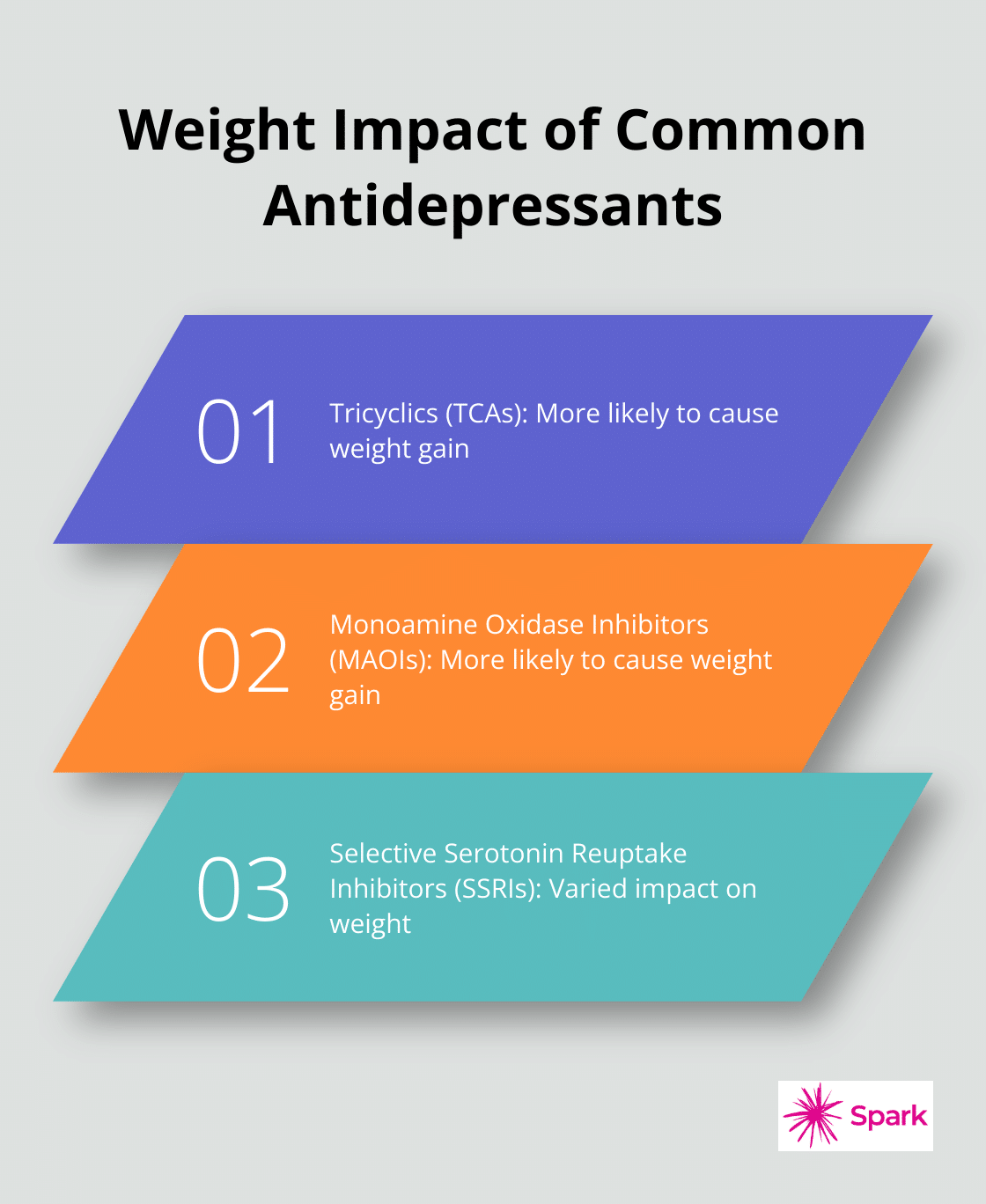Depression and weight gain often go hand in hand, creating a challenging cycle for many patients. At Spark Healthcare, we understand the importance of finding the right balance between effective depression treatment and maintaining a healthy weight.
Choosing weight loss depression medication can be a game-changer for those struggling with both mental health and weight concerns. This blog post will explore weight-friendly antidepressant options and strategies to manage weight while treating depression effectively.
Why Do Some Antidepressants Cause Weight Gain?
Depression and weight gain often intertwine, creating a complex challenge for patients and healthcare providers. Many patients express concern about potential weight changes when starting antidepressant treatment. Understanding this link is essential for effective management of both depression and weight.

The Weight Impact of Common Antidepressants
Numerous studies have investigated the effects of different classes of antidepressants on body weight. Previous clinical studies suggest that the tricyclics (TCAs) and monoamine oxidase inhibitors (MAOIs) are more likely to cause weight gain. Selective serotonin reuptake inhibitors (SSRIs) have a more varied impact.
Biological Mechanisms Behind Weight Changes
The reasons behind antidepressant-induced weight gain are multifaceted. Some medications can increase appetite directly. Others may alter metabolism or fluid retention. SSRIs can affect serotonin levels, which play a role in appetite regulation. Additionally, as depression symptoms improve, some patients may experience a return of appetite that was suppressed during their depressive episode.
How Weight Gain Affects Treatment Adherence
Weight gain can significantly impact a patient’s willingness to continue antidepressant treatment. Exposure to antidepressants is a long-term risk factor for weight gain and obesity, even after antidepressant treatment is discontinued. This can lead to non-adherence and relapse of depressive symptoms, creating a challenging cycle for patients.
Proactive Approaches to Weight Management
Healthcare providers should address weight concerns proactively. This includes:
- Monitoring weight changes regularly
- Adjusting treatment plans as needed
- Selecting weight-friendly medication options when appropriate
The Role of Lifestyle Factors
While medication plays a significant role, lifestyle factors also contribute to weight management during antidepressant treatment. Patients should focus on:
- Maintaining a balanced diet (rich in fruits, vegetables, and whole grains)
- Engaging in exercise
- Getting adequate sleep (7-9 hours per night for most adults)
These strategies can help mitigate potential weight gain and improve overall well-being. The next section will explore specific antidepressant options that have shown to be weight-neutral or even promote weight loss in some patients.
Which Antidepressants Are Weight-Friendly?
SSRIs with Minimal Weight Impact
Not all antidepressants affect weight equally. Some medications have minimal impact on weight or may promote weight loss, making them excellent options for patients concerned about potential weight gain.
Short-term studies suggest antidepressants are associated with modest weight gain, but little is known about longer-term effects and differences between medications.
Individual responses can vary. While these medications are generally weight-neutral, some patients may still experience changes in appetite or metabolism. Regular weight monitoring and open communication with your healthcare provider are essential.
Bupropion: A Potential Aid for Weight Loss
Bupropion (Wellbutrin) stands out among antidepressants for its potential to promote weight loss. Wellbutrin may cause weight loss due to its effect on neurotransmitters leading to appetite suppression.

The weight loss effects of bupropion relate to its impact on dopamine and norepinephrine (neurotransmitters involved in appetite regulation and metabolism). However, bupropion isn’t suitable for everyone. Patients with a history of seizures or eating disorders should avoid this medication.
Other Weight-Friendly Options
For patients who don’t respond well to SSRIs or bupropion, other weight-friendly options exist. Vortioxetine (Trintellix) has shown promise in clinical trials, with minimal impact on weight for most users. Studies have investigated the metabolic parameters associated with SSRI use and found an increase in obesity and hypercholesterolemia.
Another option to consider is vilazodone (Viibryd). While less studied than some other antidepressants, early research suggests it has a neutral effect on weight for most patients.
Newer medications like these may be more expensive and might not be covered by all insurance plans. Patients should discuss the potential costs and benefits with their healthcare provider.
Personalized Approach to Medication Selection
Finding the right medication that addresses both mental health needs and weight concerns requires a personalized approach. Factors such as individual health profiles, preferences, and concerns about potential side effects all play a role in medication selection.
The next chapter will explore strategies for managing weight while treating depression, including lifestyle modifications and complementary treatments that can enhance the effectiveness of antidepressant therapy.
How to Manage Weight While Treating Depression
Embrace an Active Lifestyle
Physical activity serves as a powerful tool in managing both depression and weight. Early case studies concluded that moderate-intensity exercise should be beneficial for depression and result in a happier mood. Start small – a 10-minute walk can boost your mood and metabolism. Try to increase your activity level to 150 minutes of moderate exercise per week (as recommended by the World Health Organization).

For maximum benefit, combine cardio exercises (like brisk walking or cycling) with strength training. Resistance exercises build muscle and increase your resting metabolic rate, helping you burn more calories throughout the day.
Nourish Your Body and Mind
Your diet plays a key role in managing weight and supporting mental health. Focus on whole, nutrient-dense foods that provide sustained energy and support brain function. Include plenty of fruits, vegetables, lean proteins, and whole grains in your meals.
Omega-3 fatty acids, found in fatty fish like salmon, have mood-boosting properties. A meta-analysis showed an overall beneficial effect of omega-3 polyunsaturated fatty acids on depression symptoms (SMD = -0.28, P = 0.004). Try to include fish in your diet twice a week or consider a high-quality supplement.
Be mindful of emotional eating triggers. Keep a food diary to identify patterns and work with a nutritionist to develop strategies for managing food cravings without derailing your weight management efforts.
Prioritize Quality Sleep
Poor sleep contributes to depression and can lead to weight gain by disrupting hormones that regulate hunger and fullness. Inadequate sleep is associated with alterations in the neuroendocrine appetite control mechanism, characterized by a reduction in leptin levels. Try to get 7-9 hours of quality sleep each night. Establish a consistent sleep schedule and create a relaxing bedtime routine.
If you take antidepressants that cause drowsiness, talk to your healthcare provider about adjusting the timing of your medication to minimize its impact on your sleep-wake cycle.
Seek Professional Support
Managing weight while treating depression requires patience and persistence. Telehealth services (like those offered by Spark Healthcare) make it easy to stay connected with your healthcare provider, allowing for regular check-ins and timely adjustments to your treatment plan.
Integrating these strategies into your daily life can help you effectively manage your weight while working towards better mental health. The key lies in finding a balance that works for you and staying consistent with your efforts.
Final Thoughts
Selecting the right weight loss depression medication plays a vital role in managing mental health and weight concerns. Patients should prioritize open communication with their healthcare providers throughout the treatment process. Regular check-ins enable timely adjustments to medication and treatment plans, addressing both mental health needs and weight concerns effectively.
The primary focus should always remain on treating depression, while weight management is addressed as a secondary concern. The appropriate medication, combined with lifestyle changes and therapeutic support, can significantly improve mood and overall quality of life. Spark Mental Health offers evidence-based telepsychiatry services for comprehensive, personalized care in depression and weight management.
Our approach integrates medication management with cognitive-behavioral therapy and lifestyle interventions, all accessible from home. We strive to make mental health care available to all who need it through flexible scheduling and a range of accepted insurances. The path to managing depression and weight requires patience, persistence, and close collaboration with healthcare providers.






